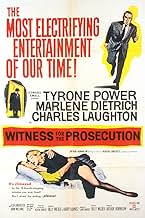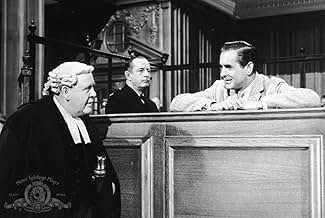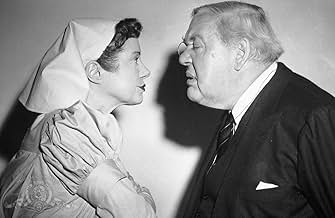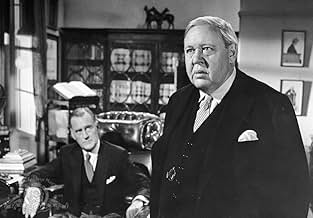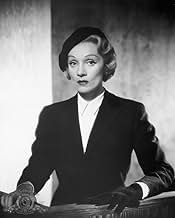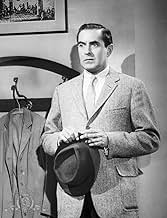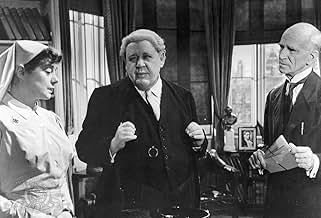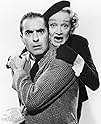Un avocat britannique chevronné doit défendre son client dans un procès pour meurtre qui ne cesse de surprendre.Un avocat britannique chevronné doit défendre son client dans un procès pour meurtre qui ne cesse de surprendre.Un avocat britannique chevronné doit défendre son client dans un procès pour meurtre qui ne cesse de surprendre.
- Nommé pour 6 oscars
- 3 victoires et 15 nominations au total
Patrick Aherne
- Court Officer
- (uncredited)
Don Ames
- Bar Patron
- (uncredited)
Larry Arnold
- Courtroom Spectator
- (uncredited)
Walter Bacon
- Bar Patron
- (uncredited)
Eddie Baker
- Courtroom Spectator
- (uncredited)
Histoire
Le saviez-vous
- AnecdotesCharles Laughton, who could be moody and difficult, was apparently a dream to work with, throwing himself into the role with dedication and delight. Billy Wilder later recalled a day that was set aside just for shooting reaction shots of the jury and courtroom crowd (composed of extras hired only for the day). Normally, the assistant director would read the actors' lines, and the extras would react. However, Laughton, who was fascinated with the whole process of filmmaking, begged to help. So he came in on his day off and read all of the off-camera speeches to the jury members. He not only read his part but also the judge's, the prosecutor's, and even Marlene Dietrich's. According to biographer Maurice Zolotow in his book "Billy Wilder in Hollywood", "it was an exhibition of craftsmanship such as Wilder had never seen. He believes that Charles Laughton had the greatest technical range and power of any actor, man or woman, whom he has known."
- GaffesWhilst the story is set in London, the script contains several Americanisms such as "cot" for bed, "banana peel" for banana skin, "travel bureau" for travel agents, "roll up" for open, "movie" for film and "Scotch" for Scottish. Whilst some may be intentional, it is odd that Sir Wilfrid or Mrs French would use such colloquialisms. Conversely the US-accented Leonard uses the correct UK "quid" with reference to money.
- Citations
Sir Wilfrid: I am constantly surprised that women's hats do not provoke more murders.
- Générique farfeluAs the end credits appear on screen, an announcer's voice is heard: "The management of this theater suggests that for the greater entertainment of your friends who have not yet seen the picture you will not divulge to anyone the secret of the ending of Witness for the Prosecution."
- ConnexionsFeatured in Marlene (1984)
- Bandes originalesI May Never Go Home Anymore
Music by Ralph Arthur Roberts
Lyrics by Jack Brooks
Sung by Marlene Dietrich (uncredited)
Reprised a cappella by Tyrone Power (uncredited)
Commentaire en vedette
In a recent biography of Billy Wilder, Agatha Christie is quoted as saying that this was the best adaption of her work ever done on the screen. I can't praise Witness for the Prosecution any higher than that.
Tyrone Power in his farewell film plays Leonard Vole who befriends a dotty old widow played by Norma Varden. She even rewrites her will leaving him the bulk of a very large estate. When she's murdered, Scotland Yard arrests Power.
Power's solicitor Henry Daniell retains a dream team for defense of John Williams and the recently recovered Charles Laughton. Laughton is recovering from a heart attack and against medical advice plunges into the case. Laughton also has to deal with the efforts of his assigned nurse Elsa Lanchester to keep him following doctor's advice.
The original play this was taken from concentrated completely on the Power character and the machinations of his wife. Wilder built up the character of the nurse and barrister Sir Wilfred Robards so that they almost equaled the screen time of Mr. and Mrs. Vole. So much so that Charles Laughton was nominated for an Academy Award in 1957, but lost to Alec Guinness.
Marlene Dietrich plays Mrs. Vole. She's a war bride over from Germany and she's got her own agenda going. Her performance and what her character does is the key to the whole film. Dietrich probably would have gotten an Oscar nomination herself, but due to the fact that if her performance was hyped up for Academy consideration, the element of surprise would have been lost in the film. Wilder in fact apologized to Marlene for that.
The Anglo-Saxon legal system's goal is justice. Justice is served though not quite in the way it usually is in Witness for the Prosecution.
Tyrone Power in his farewell film plays Leonard Vole who befriends a dotty old widow played by Norma Varden. She even rewrites her will leaving him the bulk of a very large estate. When she's murdered, Scotland Yard arrests Power.
Power's solicitor Henry Daniell retains a dream team for defense of John Williams and the recently recovered Charles Laughton. Laughton is recovering from a heart attack and against medical advice plunges into the case. Laughton also has to deal with the efforts of his assigned nurse Elsa Lanchester to keep him following doctor's advice.
The original play this was taken from concentrated completely on the Power character and the machinations of his wife. Wilder built up the character of the nurse and barrister Sir Wilfred Robards so that they almost equaled the screen time of Mr. and Mrs. Vole. So much so that Charles Laughton was nominated for an Academy Award in 1957, but lost to Alec Guinness.
Marlene Dietrich plays Mrs. Vole. She's a war bride over from Germany and she's got her own agenda going. Her performance and what her character does is the key to the whole film. Dietrich probably would have gotten an Oscar nomination herself, but due to the fact that if her performance was hyped up for Academy consideration, the element of surprise would have been lost in the film. Wilder in fact apologized to Marlene for that.
The Anglo-Saxon legal system's goal is justice. Justice is served though not quite in the way it usually is in Witness for the Prosecution.
- bkoganbing
- 5 mars 2006
- Lien permanent
Meilleurs choix
Connectez-vous pour évaluer et surveiller les recommandations personnalisées
Détails
- Date de sortie
- Pays d’origine
- Langues
- Aussi connu sous le nom de
- Témoins à charge
- Lieux de tournage
- société de production
- Consultez plus de crédits d'entreprise sur IMDbPro
Box-office
- Budget
- 3 000 000 $ US (estimation)
- Brut – à l'échelle mondiale
- 7 903 $ US
- Durée1 heure 56 minutes
- Couleur
- Rapport de forme
- 1.66 : 1
Contribuer à cette page
Suggérer une modification ou ajouter du contenu manquant

Lacune principale
What is the streaming release date of Witness for the Prosecution (1957) in Brazil?
Répondre
![Regarder Trailer [OV]](https://m.media-amazon.com/images/M/MV5BNTM2MjYzMjAtZjI5MC00YTI1LWI2MzAtMWFlNDc2OTU1MTRiXkEyXkFqcGdeQXRyYW5zY29kZS13b3JrZmxvdw@@._V1_QL75_UX500_CR0)
